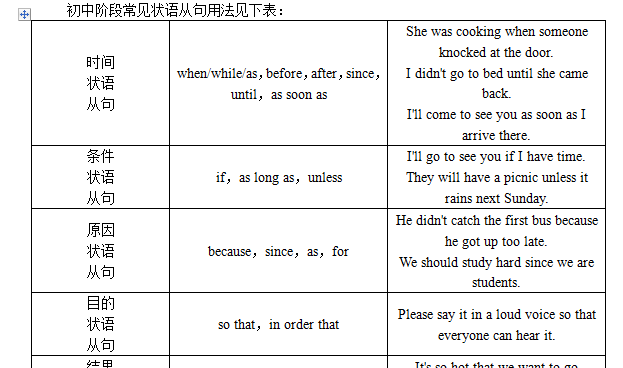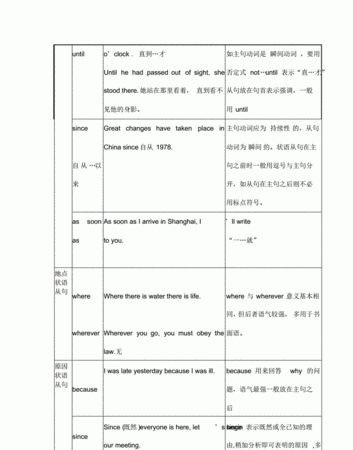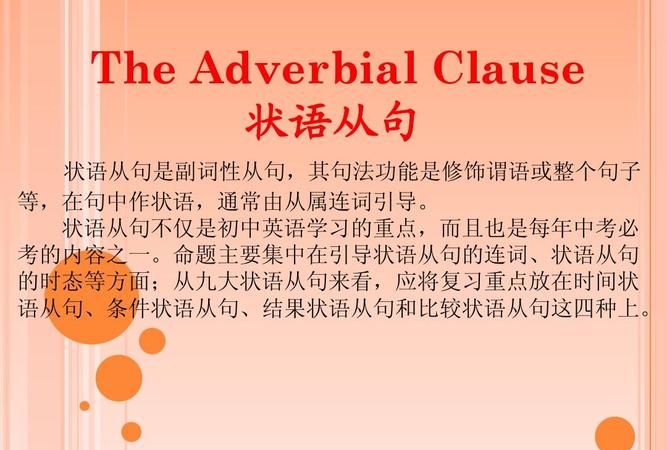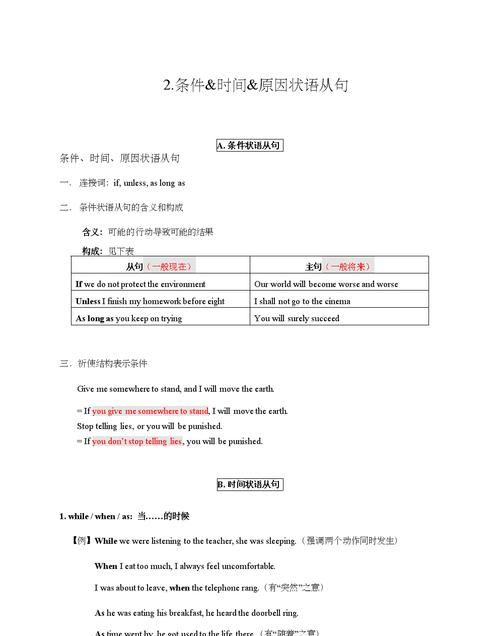本文目录
什么是状语从句
状语从句是指:在一个复合句中,起副词作用的状语由一个句子充当,这个句子就叫状语从句。
状语从句也像状语一样,可以表示时间,地点原因,方式。条件等等。

方式状语从句是什么意思
状语是对时间、地点的描述,用where,when,as等词连接,从句不倒装
Eg:
I live in Beijing where I am born.
She went to bed when she felt sleepy.
与定于从句的区别在于:Eg: I live in Beijing which I am born in. in 后面的宾语省略

什么是状语从句
状语从句指句子用作状语时,起副词作用的句子。它可以修饰谓语、非谓语动词、定语、状语或整个句子。
状语从句主要用来修饰主句或主句的谓语。一般可分为九大类,分别表示时间、地点、原因、目的、结果、条件、让步、比较和方式。尽管种类较多,但由于状语从句与汉语结构和用法相似,所以理解和掌握它并不难。状语从句的关键是要掌握引导不同状语从句的常用连接词和特殊的连接词即考点。 现分别列举如下:
1.时间状语从句
常用引导词:when, as, while, as soon as, while, before, after, since , till, until
特殊引导词:the minute, the moment, the second, every time, the day,the instant, immediately , directly, no sooner … than, hardly …when, scarcely … when
I didn't realize how special my mother was until I became an adult.
While John was watching TV, his wife was cooking.
The children ran away from the orchard(果园) the moment they saw the guard.
No sooner had I arrived home than it began to rain.
Every time I listen to your advice, I get into trouble.
2.地点状语从句
常用引导词:where
特殊引导词:wherever, anywhere, everywhere
Generally, air will be heavily polluted where there are factories.
Wherever you go, you should work hard.
3.原因状语从句
常用引导词:because, since, as, for
特殊引导词:seeing that, now that, in that, considering that, given that, considering that, as much as, so much as
My friends dislike me because I'm handsome and successful.
Now that everybody has come, let's begin our conference.
The higher income tax is harmful in that it may discourage people from trying to earn more.
Considering that he is no more than 12 years old, his height of 1.80 m is quite remarkable.
4.目的状语从句
常用引导词:so that, in order that
特殊引导词:lest, in case, for fear that,in the hope that, for the purpose that, to the end that
The boss asked the secretary to hurry up with the letters so that he could sign them.
The teacher raised his voice on purpose that the students in the back could hear more clearly.
5.结果状语从句
常用引导词:so that, so… that, such … that,
特殊引导词:such that, to the degree that, to the extent that, to such a degree that,
He got up so early that he caught the first bus.
It's such a good chance that we must not miss it.
To such an degree was he excited that he couldn't sleep last night.
6.条件状语从句
常用引导词:if, unless,
特殊引导词:as/so long as, only if, providing/provided that, suppose that, in case that, on condition that
We'll start our project if the president agrees.
You will certainly succeed so long as you keep on trying.
Provided that there is no opposition, we shall hold the meeting here.
7.让步状语从句
常用引导词:though, although, even if, even though
特殊引导词: as(用在让步状语从句中必须要倒装),while ( 一般用在句首 ),no matter …, in spite of the fact that, while, whatever, whoever, wherever, whenever, however, whichever
Much as I respect him, I can't agree to his proposal.
尽管我很尊敬他, 我却不同意他的建议。
The old man always enjoys swimming even though the weather is rough.
No matter how hard he tried, she could not change her mind.
He won't listen whatever you may say.
8.比较状语从句
常用引导词:as(同级比较), than(不同程度的比较)
特殊引导词:the more … the more … ; just as …, so…; A is to B what /as X is to Y; no … more than; not A so much as B
She is as bad-tempered as her mother.
The house is three times as big as ours.
The more you exercise, the healthier you will be.
Food is to men what oil is to machine. 食物之于人,犹如油之于机器。
9.方式状语从句
常用引导词:as, as if, how
特殊引导词:the way
When in Rome, do as the Roman do.
She behaved as if she were the boss.
Sometimes we teach our children the way our parents have taught us.

什么叫表语从句
句子的表语是由一个句子充当的,那么这个充当表语的句子就叫做表语从句
The fact is that he was cheated.
这是个系表结构的句子,the fact是主语,谓语是系表结构,表语是that he was cheated,这个that引导的句子就是表语从句.
宾补和双宾的区别先看下面两个句子
They elected him president.
I sent him a telegram.
第一个句子里面的him是elect的宾语,而president则不是elect的宾语,它是补充说明宾语him的情况.
第二个句子里面的him 依然是send的宾语,而telegram也是send的宾语状语从句可分为:
时间状语从句、 地点状语从句、
原因状语从句、 目的状语从句、
结果状语从句、 条件状语从句、
让步状语从句
状语从句有其相对独立的一套连词,连词本身带有自己的意思。
一. 时间状语从句
引导时间状语从句的从属连词很多,如较基本的有before, after, when, while, as, since, till, until, as soon as
此外还有有一些(杂牌)连词,也能起连接句子的作用,如:the moment, the minute, the second, immediately, directly, instantly, once,no sooner…than, hardly…when[一……就]; every time(每次),each time(每次), the first time(第一次)
eg: Immediately he came I told him the news. 他一来我就把消息告诉了The moment I saw him I knew there was no hope. 我一看到他就知道没希望了。
He felt nervous each time she spoke to him. 每次她和他讲话,他都感到紧张。
※ 时间状语的一些常见结构
1. … was/were doing … when …
…was/ were about to do … when…
was/were on the point of doing…when
2. It was/will be +段时间+before
①(肯定句) 过多久… 就/才
②(否定句) 不久…就/才
eg: It will be one year before we graduate from middle school.
3. It is+段时间+since +句子(一般过去时)
① (短暂动词) 自…以来已经多久了
② (延续动词)自...以来过久没… 了
eg: It is six years since I graduated.
4. It is + 时间点 + when …
当……时已是 …..时间了
二. 条件状语从句引导条件状语从句的从属连词主要有 if, unless, as [so] long as, in case, if only等。
eg: Don’t come unless I telephone.
除非我打电话,否则你别来。
If you watch carefully you will see how to do it.
如果你仔细瞧你会看出该怎样做。
As long as you do your best, we’ll be happy. 只要你尽力,我们就满意了。
If only(==I wish) I were a bird.
三. 让步状语从句
1. 引导让步状语从句的从属连词主要有 although, though, however (=no matter how), even if(即使), whether…or(不论…还是), whatever, whoever, whenever, wherever [no matter what/who/how/where] 等引导让步状语从句。如:
eg: Although he is poor, he’s still happy. 虽然他很穷,他仍然很快乐。
I will try it, though I may fail. 即使我可能失败, 我也要试一下。
I’ll do it whether you like it or not. 不管你是否喜欢,我都要做。
※ as 也可引导让步状语从句,但句子语序特殊,要将名词、形容词或副词等提到 as 前,若提前的是单数可数名词,要省略 a / an。如:
eg: Young as he is, he knows a lot.
Teacher as he is, he can’t know everything. 虽然是老师,他也不可能什么都懂
四. 原因状语从句
1. 引导原因状语从句的从属连词主要有because, as, since, seeing (that), now (that), for等:
eg: They can’t have gone out because the light’s on. 他们不可能出去了,因为灯还亮着。
Since you are going, I will go.
既然你去,我也去。
Now that we are alone, we can speak freely. 现在我们单独在一起,可以随便谈了。
五. 地点状语从句
引导地点状语从句的从属连词主要有where (在…的地方), wherever(无论什么地方), everywhere(每个…地方), anywhere(任何…地方)。如:
eg: Where there is a river, there is always a city.
I’m not living where I was. 我不在原处住了。
没有with引导的从句,而是with由它自己的用法
***/200905/1476.html
你自己看看他的用法

以上就是关于充当什么的从句称为状语从句 ,什么是状语从句的全部内容,以及充当什么的从句称为状语从句 的相关内容,希望能够帮到您。
